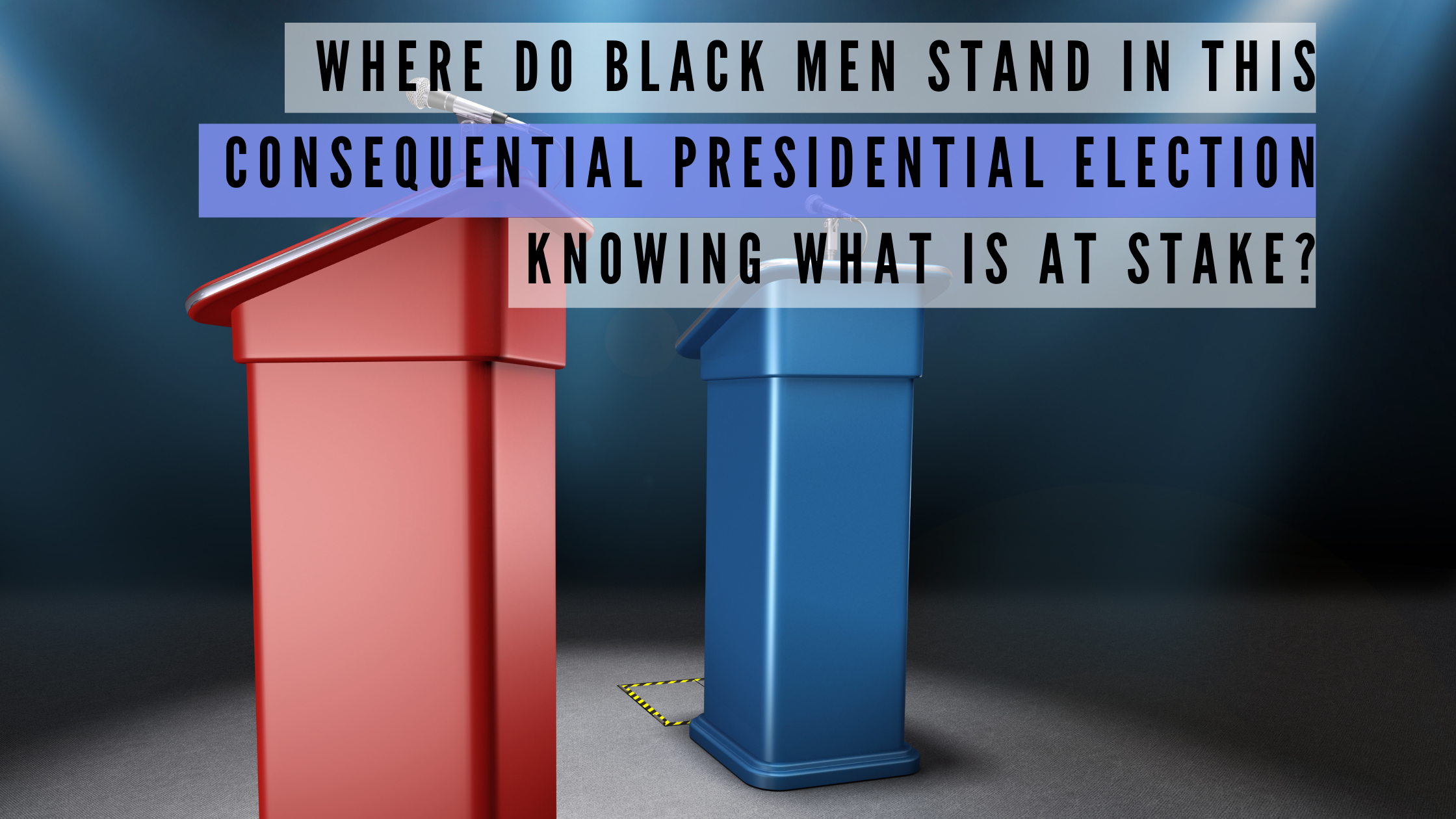Men Leaders
“Where Do Black Men Stand In This Consequential Presidential Election Knowing What Is At Stake?”
For Black men contemplating their political allegiance, it is crucial to recognize that Trump’s insults and derogatory comments are not mere blunders; they are indicative of a broader ideology that devalues the contributions and voices of Black individuals. His disdain for accountability and truth-telling erodes any claim he might have to be an ally. As you evaluate your choices this election season, consider the implications of supporting a candidate who has repeatedly shown that he is more interested in self-preservation than uplifting the community he seeks to engage. Trump’s actions and words reveal a character that is fundamentally at odds with the values of respect, equality, and justice that resonate within the Black community.

As the 2024 presidential election approaches, the political landscape reveals an unsettling divide among Black men in America. The choice between Vice President Kamala Harris and former President Donald Trump has become a contentious issue, marked by misinformation, deep-seated biases, and a troubling history of racial dynamics. While some Black men are drawn to Trump despite his controversial track record, others are wary of Vice President Harris due to misleading narratives about her past as a prosecutor. This article explores the complexities of this political landscape and urges Black men to evaluate their choices in light of the facts critically.
The Influence of Misinformation
In recent years, a surge in misinformation has clouded the public perception of Vice President Kamala Harris. As a former state attorney general, she has faced backlash for her decisions in prosecuting crimes, with critics wrongfully branding her as a “cop” who “locked up innocent Black men.” This narrative, often perpetuated by Trump and his supporters, ignores the context of her tenure and the systemic issues that plague the criminal justice system. Black men must recognize that Vice President Harris’s efforts to reform these systems often get overshadowed by sensationalized claims.
On the other side, Trump’s history of inflammatory comments and actions raises significant questions about his character and intentions, particularly regarding his treatment of Black men and women. His disdainful remarks toward Black women are well-documented, including calling journalist Jemele Hill “dumb” and referring to Congresswoman Maxine Waters as “low IQ.” However, his derogatory comments about Black men are equally troubling. For instance, when speaking about Black professional athletes who protested police brutality, he infamously declared that they were “sons of a bitches” who should be fired for taking a stand against injustice. Such insults are not just random outbursts; they reflect a broader pattern of contempt for those who dare to hold him accountable or challenge his authority.
Trump’s name-calling extends to prominent figures like former CNN anchor Don Lemon, whom he has dismissed as “a total loser,” and New York Attorney General Letitia James, whom he labeled as “a political hack” when she pursued legal actions against him. These remarks reveal a troubling tendency to belittle those who oppose him or seek to expose the truth, mainly when they are Black. His rhetoric sends a clear message: dissent and accountability will be met with scorn rather than respect.
Furthermore, Trump has a history of using derogatory language to diminish the accomplishments of Black men. He has referred to players in the NFL as “disgraceful” for kneeling during the national anthem, attempting to undermine their legitimate concerns about racial injustice and police violence. In contrast, he often aligns himself with a few select Black figures, positioning them as tokens of his supposed support for the community while simultaneously disregarding the vast majority who challenge his policies and rhetoric. This strategy of tokenism is a manipulation tactic designed to create a façade of inclusivity while neglecting the systemic issues that affect the broader Black community.
For Black men contemplating their political allegiance, it is crucial to recognize that Trump’s insults and derogatory comments are not mere blunders; they are indicative of a broader ideology that devalues the contributions and voices of Black individuals. His disdain for accountability and truth-telling erodes any claim he might have to be an ally. As you evaluate your choices this election season, consider the implications of supporting a candidate who has repeatedly shown that he is more interested in self-preservation than uplifting the community he seeks to engage. Trump’s actions and words reveal a character that is fundamentally at odds with the values of respect, equality, and justice that resonate within the Black community.
The Temptation of Trump
Despite everything, some Black men find themselves drawn to Trump, a phenomenon that is perplexing given his track record. His strategy includes appealing to select high-profile Black individuals by offering favors or pardons, which can create a facade of support. However, this transactional approach raises serious ethical questions: Is this genuine support, or is it a calculated effort to manipulate perceptions for electoral gain? Trump’s history of racial discrimination in housing, where he denied Black applicants access to his properties, reveals a fundamental hypocrisy in his claims of being a champion for the Black community.
Moreover, Trump’s relentless blame-shifting and refusal to take responsibility for his actions are concerning traits for someone seeking the highest office in the land. His recent legal troubles, including indictments and convictions, illustrate a pattern of behavior that prioritizes self-interest over accountability. How can a president uphold the law when he consistently operates outside it? This lack of integrity is particularly troubling given the responsibility that comes with the presidency — to serve all Americans, not just those who align with personal interests.
The Case for Informed Voting
As the election draws near, Black men must critically assess the narratives they consume. Social media platforms have become breeding grounds for misinformation, proliferating fake videos and misleading narratives. It is essential to scrutinize these sources and seek out credible information. The stakes are high, and the implications of this election will resonate far beyond just one term in office.
Voting for Trump may seem appealing to some. Still, it is essential to recognize the broader implications of supporting a candidate who has shown a blatant disregard for the rule of law and a history of racially disparaging comments. Instead, consider the potential of a candidate like Kamala Harris, who, despite criticisms, has shown a commitment to addressing systemic inequities through her policies and advocacy.
Furthermore, navigating concerns about abortion and LGBTQ rights should not overshadow the larger fight for racial justice and equality.
Conclusion: Trust, Character, and Accountability
As Black men engage in this consequential election, the values of trust, character, and accountability must guide their decisions. The political landscape is fraught with manipulation and misinformation, but it is crucial to look beyond the surface. Trump’s actions are often self-serving and designed to maintain power rather than uplift the community. The evidence is clear. He has only done a fraction of what he claims for the Black community, and his motives should be questioned.
In this election, rejecting the narratives that divide and mislead is vital. Embrace informed decision-making and consider the broader implications of your vote. Remember that who ultimately leads this country affects everyone, and your voice matters. Choose wisely, for the future of your community and the nation hangs in the balance.
The Last & Final Plea to Black Men
In this consequential presidential election, the stakes for the Black community, particularly Black men, could not be higher. With the weight of history on their shoulders, they must confront the stark reality that Donald Trump has consistently failed to champion their rights or uphold their dignity. His policies of granting police complete immunity lay the groundwork for unchecked brutality, perpetuating a cycle of violence against Black men. At the same time, he hypocritically criticizes Vice President Kamala Harris for her role in enforcing the law—a role she undertook not out of malice but as a duty to serve her community. The chilling reality is that Trump’s rhetoric has often devolved into dangerous absurdities—his bizarre claims about “illegal Haitians eating pets” and nonsensical references to “Hannibal Lecter” reveal a man out of touch with reality, unfit to lead a diverse nation.
As Black men weigh their choices in this election, they must confront uncomfortable truths about their feelings toward a highly educated, accomplished woman of color in Vice President Harris. The insecurities that may lead some to reject her candidacy will only reinforce the stereotypes they seek to dismantle. In contrast, they risk aligning themselves with a man whose presidency has been marred by convicting felonies, inciting violence, and undermining our democracy. Trump’s history is littered with insults and disparagement toward the Black community—from his infamous comments about the Central Park Five to his discriminatory housing practices. He has used Black men as props in his pursuit of power, often vilifying them while pretending to be their ally, all while appointing a cabinet composed of white men predominantly—over 98% in top positions and similar figures in judicial appointments, leaving little room for the voices of Black individuals in critical decision-making roles.
The warnings from former top officials in his administration—Republicans of high standing, including generals, senators, and members of Congress—should resonate deeply with all voters, especially Black men. Their insights into Trump’s character reveal a man who sees people like them as dispensable, only valuing them when it serves his agenda. The alarming associations he maintains with figures like Marjorie Taylor Greene and Lauren Loomer—individuals known for their extremist views—highlight the disturbing normalization of hatred and division within his circle. This is not the behavior of a leader who aspires to unite all Americans. It is the behavior of a man who thrives on chaos and division.
As we stand at this crossroads, the choice is clear: Black men must reject Trump’s dangerous agenda and support Vice President Harris, a leader who embodies the values of inclusivity, justice, and respect for all. The time has come to rise above insecurities and embrace a future where Black voices are heard and respected, where their lives are valued, and where they are no longer used as pawns in a game of political chess. The path forward is one that embraces progress and empowers every member of our community—starting with the brave decision to stand against Trump and advocate for a leader who truly represents their interests.
-

 Health / Wellness7 years ago
Health / Wellness7 years agoThese ’90s fashion trends are making a comeback in 2017
-

 Career Men8 years ago
Career Men8 years agoThe old and New Edition cast comes together to perform
-

 Health / Wellness8 years ago
Health / Wellness8 years agoAccording to Dior Couture, this taboo fashion accessory is back
-

 Men in Sports8 years ago
Men in Sports8 years agoUber and Lyft are finally available in all of New York State
-

 Young Men Entrepreneur8 years ago
Young Men Entrepreneur8 years agoSignings, trades shift balance of power across the NHL
-

 Career Men8 years ago
Career Men8 years ago‘Better Call Saul’ has been renewed for a fourth season
-

 Women Leadership Network1 year ago
Women Leadership Network1 year agoCongress rolls out ‘Better Deal,’ new economic agenda
-

 Career Men6 months ago
Career Men6 months ago“The Looming Threat: Corporate Greed in Capitalism, Free Market, and the US Economy MUST Be Checked!”

















